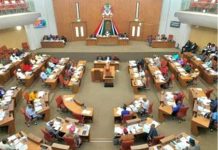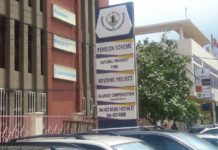By: Kebba AF Touray
The Governor of the Central Bank of The Gambia, Bakary Jammeh, said the Gross Domestic Product (GDP), is projected to grow by 3.5 in 2017, to 5.4 percent in 2018.
Mr. Jammeh made these remarks during the Monetary Policy Meeting yesterday, May31st 2018, at the Central Bank Building in Banjul. Governor Jammeh disclosed that this is due mainly to a rebound in agriculture and the continued improvement in trade, tourism and construction.
Governor Jammeh revealed that the global economy is forecast to grow from 3.8 percent in 2017, to 3.9 in 2018, due to the continued recovery in commodity prices and strong global demand (IMF Reports).
On the external sector, he disclosed a narrowed deficit of U$ 29.45 million to U$7.01 million, which is equivalent to 2.7 percent of GDP a year ago, to 0.7 percent of GDP in the first quarter of 2018; that this reflects a marked increase in current transfers (mainly remittances), by 62.2 percent, to U$ 60.71 million. He however said goods account balance worsened from a deficit of U$ 54.61 million (5.2 percent of GDP) in the first quarter of 2017, to a deficit of U$ 67.46 million (6.1 percent of GDP) in the first quarter of 2018, indicating a sharp decline in exports and a significant increase in imports.
“The capital and financial account balance declined to a surplus of U$ 7.43 million in first quarter of 2018, from a surplus of U$ 27.36 million in the same period a year ago, due strong international support and improved domestic foreign exchange market conditions, whilst gross international reserves is projected at 4 months of next year’s import of goods and services,” he said.
He revealed that growth in the domestic foreign exchange market increased from 1.3 billion in 2017 to U$ 1.7 billion this year, reflecting improvement in market confidence and conditions. He cited the increment in the purchase of foreign currency at 31.1 % or U$ 863.7 million from 31.2 percent or 652.0 million, during the period under review.
Governor Jammeh further revealed a decrease in domestic debt from 29.3 billion (62.2 percent of GDP) in April 2017 to D28.8 billion (55.8% of GDP in April 2018), whereas stock of Treasury and Sukuk Al Salaam bills contracted by 13.5 percent to 16.1 billion during the period under review.
“Yields on all Treasury and Sukuk Al Salaam bills, reflect reduced borrowing by Government. The 91 day and 364 day yields went down from 9.37 percent, 11.29 percent and 12.88 percent in April 2017 to 5.87, 5.99 and 9.23 percent in April 2018”, he said.
He stressed that the risk weighed on the Banking Sector, stood at 31 percent as at end March 2018, significantly higher than the statutory requirement of 10 percent, whereas the liquidity ration of the Banking industry, stood at 93.7 percent, higher than the required 30 percent. He said the non-performing loans ratio dropped from 9.7 percent at end March 2017, to 7.2 percent the same period in 2018, whilst total assets of the industry expanded from D33.5 billion as at end March 2017, to D39.8 billion as at end March 2018.
Money supply grew by 28.0 percent in March 2018 from 1.5 billion in March 2017, to 8.0 billion in March this year; that net domestic assets of the Banking system rose by 1.0% to 22.4 billion and the reserve money or Bank’s operating target, grew by 24.2 percent in March 2018, relative to 18.1 percent a year ago.
“Private sector credit recovered strongly by 6.2 percent in March 2018, mainly due to a slowdown in Government borrowing, whilst the Banking system’s net claims on Government, contracted by 5.8 percent,” he added
Governor Jammeh said the consumer price inflation declined from 8.7 percent in April to 6.6 percent in April 2018, compared to March 2017 wherein inflation edged up slightly by 0.1 percent, to temporal factors, while food inflation remains unchanged at 6.4 percent.
On the inflation outlook, he said the committee observed that the economic and business environment continues to improve and recovery is gaining momentum, due to sound macroeconomic policies, strong international support and improved confidence, reduced Government borrowing and a decline in interest rates, the private sector amongst others.
He said the committee decided to reduce the policy rate by 1.5%, to reinforce private sector credit growth to small and medium size enterprises and will continue to closely monitor domestic and international economic development.
He announced that the MPC has introduced an overnight interest corridor, effective 30th August 2018, with the objective of limiting the short term interest rate volatility, around key monetary policy interest rates.





















